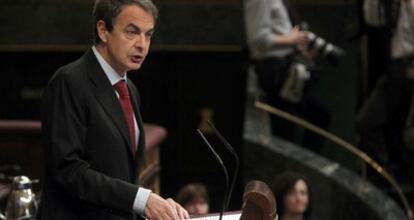Zapatero secures near unanimous support in Congress for military action in Libya
Prime minister stresses that the objective is not about getting rid of Gaddafi, but rather protecting the Libyan people. Opposition leader Rajoy backs the government, but expresses doubts
"We are in Libya to defend citizens from attacks by Libyan forces," said the prime minister, José Luis Rodríguez Zapatero, on Tuesday as he called on Congress to ratify Spain's participation in military action in the North African country, shortly after the four Spanish fighter jets that had been sent to the country returned to base after carrying out their second patrol as part of the international mission against Colonel Gaddafi.
There were only three votes against from the deputies (from the United Left and Galician Nationalist Bloc parties) and one abstention. All parliamentary groups expressed their support, although some members of the opposition Popular Party (PP) voted expressing their doubts, and distancing themselves from the government, in order to emphasize the fact that the decision is Zapatero's, and therefore his responsibility.
"The [UN] resolution [1973] does not aim to, nor does it allow for, the expulsion of Gaddafi. Its objective is to warn him that he must stop using arms against his people and that the international community is willing to use force," the prime minister explained.
He went on to say that since the operation began, "there have been several withdrawals, but while the risk that he might attack his people remains, the necessary force to prevent that will be used. This is about protecting the Libyan people from their own authorities."
For the fourth consecutive day, planes from international forces have carried out bombing missions in Libya, but are yet to put a stop to Colonel Gaddafi's offensive.
Zapatero took special care to explain that the mission has a UN mandate, based on the principle that "the responsibility is to protect: if a state does not do its duty to protect, we must intervene."
The prime minister went on to speak about "the dawn of a new political era in the Mediterranean," as well as the "bravery and civic spirit of the Tunisian and Egyptian people."
Opposition Popular Party leader Mariano Rajoy made clear that his party supported the military action, but also distanced himself from the government. He said that the PP would not "hinder" the operation, and repeatedly stressed that the decision to join the international mission was Zapatero's. He was careful to point out that he was not jointly responsible for the decision at any moment, backing up this claim with the fact that the bombing campaign began four days ago.

Tu suscripción se está usando en otro dispositivo
¿Quieres añadir otro usuario a tu suscripción?
Si continúas leyendo en este dispositivo, no se podrá leer en el otro.
FlechaTu suscripción se está usando en otro dispositivo y solo puedes acceder a EL PAÍS desde un dispositivo a la vez.
Si quieres compartir tu cuenta, cambia tu suscripción a la modalidad Premium, así podrás añadir otro usuario. Cada uno accederá con su propia cuenta de email, lo que os permitirá personalizar vuestra experiencia en EL PAÍS.
En el caso de no saber quién está usando tu cuenta, te recomendamos cambiar tu contraseña aquí.
Si decides continuar compartiendo tu cuenta, este mensaje se mostrará en tu dispositivo y en el de la otra persona que está usando tu cuenta de forma indefinida, afectando a tu experiencia de lectura. Puedes consultar aquí los términos y condiciones de la suscripción digital.








































